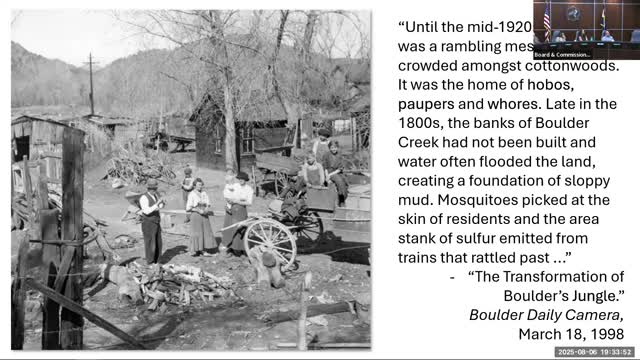Boulder Council's Park Development Erases Legacy of Displaced Black Residents
August 08, 2025 | Boulder, Boulder County, Colorado
Thanks to Scribe from Workplace AI , all articles about Colorado are free for you to enjoy throughout 2025!

This article was created by AI using a video recording of the meeting. It summarizes the key points discussed, but for full details and context, please refer to the video of the full meeting. Link to Full Meeting
During the session, board members presented research that traced the evolution of the Civic Area from a vibrant neighborhood in the late 1800s to a site of significant urban redevelopment. The area, once home to diverse residents, including African Americans and immigrants, was characterized by its bustling community life, which included a red-light district managed by notable figures such as Molly Gordon, the first Black woman to own property in Boulder.
The discussions underscored how the city’s efforts to beautify and modernize the area in the early 20th century led to the systematic displacement of its residents. The board noted that narratives used to justify these actions often included derogatory terms that dehumanized the community, framing them as undesirable. This historical context is crucial as it reveals the impact of urban planning decisions on vulnerable populations and the importance of acknowledging their stories.
Additionally, the board emphasized the role of historical narratives in shaping public perception. The research presented indicated that many contemporary accounts have perpetuated harmful stereotypes about the residents of the Civic Area, often overlooking their contributions to the community. The board aims to rectify this by incorporating a broader range of perspectives in future historical documentation and city planning efforts.
As Boulder continues to evolve, the Landmarks Board's commitment to uncovering and sharing these hidden histories is vital for fostering a more inclusive community narrative. The meeting concluded with a call to action for city officials to consider the implications of past decisions on current urban development and to ensure that all voices are represented in the ongoing story of Boulder.
Converted from 8-6-25 Landmarks Board Meeting meeting on August 08, 2025
Link to Full Meeting
Comments
View full meeting
This article is based on a recent meeting—watch the full video and explore the complete transcript for deeper insights into the discussion.
View full meeting
